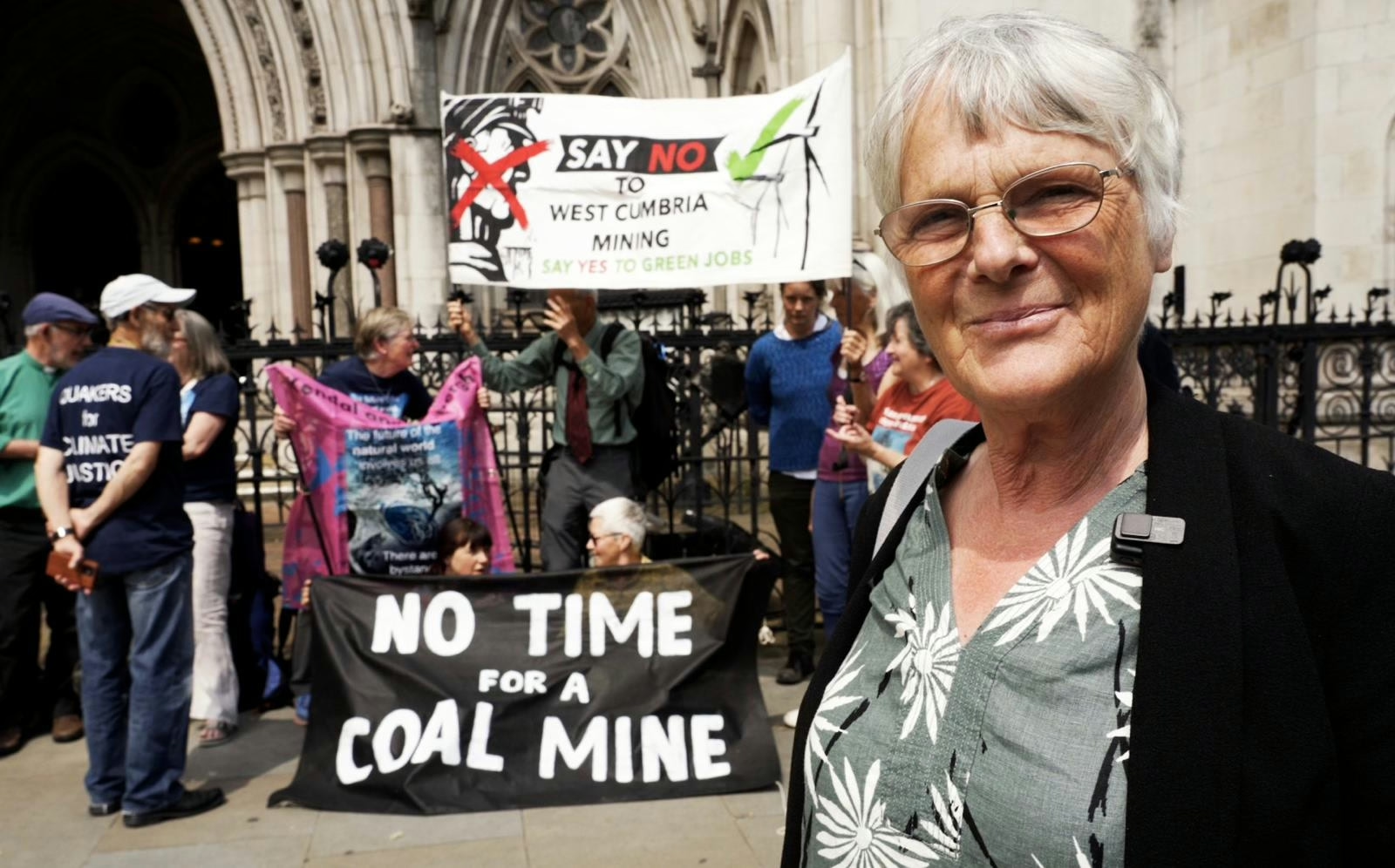The Coal Authority has issued the Aberpergwm coal mine with a licence to mine an extra 42 million tonnes of coal, ignoring the est.100 million tonnes of CO2 this will generate and jeopardise the UK's and Wales' ability to meet their climate commitments. Check out what we're doing now to stop the Aberpergwm coal mine expansion.
Currently, the Welsh Government and the UK’s Government Ministry of BEIS are arguing over which has the legal power to cancel the impending licence for a coal mine extension in Aberpergwm, south Wales. EnergyBuild Ltd, the coal operator, is on the brink of getting a licence to extend an existing deep coal mine to extract a further 40 million tonnes of coal, emitting around 100 million tonnes of CO2 and methane, until 2039. The licence could be obtained any day, and work begin shortly thereafter (we’ve illustrated the main legal steps a coal mine takes between application and diggers on the land). This is a very live issue.
Demand Ministers block this coal mine extension now.
The governments of Wales and the UK both believe that the other has the power to stop the coal mine extension from going ahead. In the meantime, and in the shadow of the recent COP26 in Glasgow, a licence to extract a further 40 million tonnes of coal could slip through any day. The estimated 100 million tonnes of CO2 and methane this would emit over the next 18 years, would discredit the much-boasted 2050 Net-Zero commitment, Boris Johnson’s recent statement in the press against new coal, and the Welsh Ministerial statement against coal in March 2021. The signal this may send to other world leaders, that they can make commitments then ignore them, is hard to quantify but may be even more significant. Ministers Lee Waters of the Welsh Government, and Michael Gove of the UK Government, need to come together to stop this coal mine and make good on their respective governments' climate commitments.

The distance between the coal mine and the nearest residence in Aberpergwm is just 330 metres. Although this is a deep coal mine rather than opencast, this proximity can still be associated with impacts from coal dust from coal stockpiles stored above ground, noise, HGV movements, and light pollution. Future impacts of the underground working are also uncertain with increasingly extreme weather events associated with climate change.
For people living in many parts of the Global South, on flood planes, or near sea-level, climate change is not an abstract threat for future generations – it's impacts are life and death, and are experienced now and locally to them. The line between who we think of as ‘local communities’ is beginning to blur as the impacts are increasingly experienced beyond the site of operations. The economic and health impacts of the coal mine extension going ahead or closing will be immediate, direct, and tangible on the residents in Aberpergwm. The impacts of the CO2 and methane from this coal mine will be delayed, indirect, and, although modelling tools attempt to quantify it, fairly intangible on communities threatened now by climate change. However, the consequences are profound for both groups, and must be considered.

Cutting through the greenwash, a significant portion of the coal will be burned at steelworks releasing huge amounts of CO2 and other pollutants, jeopardising the rapid decarbonisation required of the global steel industry and other industries which are reliant on coal.

A visit to Companies House online will reveal a complicated operating structure of many small companies with similar names and shared registered addresses associated with Energybuild Ltd, the coal operator in Aberpergwm. The company itself has negligible assets, so the possibility of recovering funds if the company suddenly folded with liabilities is limited. The situation with its holding company, Energybuild Resources Ltd is also concerning, with net liabilities of £2.7 million and assets valued at £950 thousand as of the end of 2019 – meaning that if the company were to fold, around 65% of those liabilities may not be fulfilled, including restoration works.
Wales played a major role in mining the coal that powered the UK through an industrial revolution. Coal is a central part of a proud heritage in many communities throughout Wales, and for a few remaining areas, coal mining is still the major industry.
The closure of many coal mines under the Thatcher Government put thousands out of work, generating bitterness and deprivation that continues to this day. Much of this hardship could have been avoided if coal mining had been phased out and replaced by reinvesting some of the wealth that mining generated back into the communities that toiled to extract it.
Local shops and pubs, in particular, in recent press coverage have come out in support of a licence for the coal mine extension, highlighting their reliance on the custom of coal miners that work there. But without the support for creating alternative jobs that’s been absent so far, these businesses will be in the same position when the coal mine does eventually close.
Will the UK Government learn from its past mistakes in coal, and make good on its promise to ‘level up’ the UK with an approach that includes investment in infrastructure, retraining in desirable and viable jobs, and financial support for small and medium sized enterprises, particularly cooperative and social-interest companies that build and reinvest in their communities? Only when the UK and Welsh governments step up will communities in Aberpergwm have a genuine choice on whether to tolerate a coal mine nearby for another 18 years.
The Aberpergwm extension may represent the final gasps of an industry we owe much to but must move beyond. As one tenacious community member fighting a coal mine near Newcastle put it, "coal is our collective heritage, but it cannot be our future".
Following almost 4000 emails, we've followed up with an open letter to Ministers Lee Waters and Michael Gove.

From Tuesday 16th July to lunchtime 18th July, Lord Holgate heard the case, brought by South Lakes Action on Climate Change and Friends of the Earth, against the Government’s 2022 approval of a new underground coal mine at Whitehaven.

Fantastic news today, 20th June 2024. The UK Supreme Court has set a historical precedent, in overturning a previous ruling, considering the legality of approving a new oil site in Surrey. The ground breaking decision stating that ‘downstream’ emissions (those released when a product is used) must be factored into decisions on…

The UK’s last coal-fired power station closes this year, and last year is confirmed the hottest year on record. We’re pleased that the Labour Party has listened to our arguments, along with the Liberal Democrats, the Green Party, and Plaid Cymru which have also ruled out any new coal mining…

Coal Action Network asked Who will stop coal? last weekend in Whitehaven, West Cumbria. At the site of the proposed coal mine, members of the local community and supporters gathered to ensure that the question of the mine is being put to election candidates. Now we need you to crank up the pressure and make sure all election candidates across the UK faces this question as they could decide the fate of the coal mine if elected…

The legal challenges against the government’s approval of a new coal mine off the coast of Cumbria will be heard in London on the 16th to 18th July.

Mining company, ERI Ltd, is applying to mine nearly half a million tonnes of coal from two coal tips dumped in Caerphilly, South Wales by the same mining industry last time it operated in the area.

Mining company, ERI Ltd, is applying to mine nearly half a million tonnes of coal from two coal tips dumped in Caerphilly, South Wales, by the mining industry last time it operated in the area. It’s vital we stop this shameless attempt to exploit the mess left behind by the mining industry to justify yet more mining. If the coal tip mining were to go ahead, it would…

Coal Action Network’s drone footage on Monday 11th March raised the alarm bell about the rising water levels. With this footage, a local resident informed Merthyr Tydfil County Borough Council of the rising water levels, only to be told…

The insurance industry found itself in the spotlight last week as a Global Week of Action blossomed across the world. From February 27th to March 3rd 2024, a wave of protests, both online and in the streets, swept through the doors of insurance giants, demanding accountability over their support for polluters and decisive action on climate change.